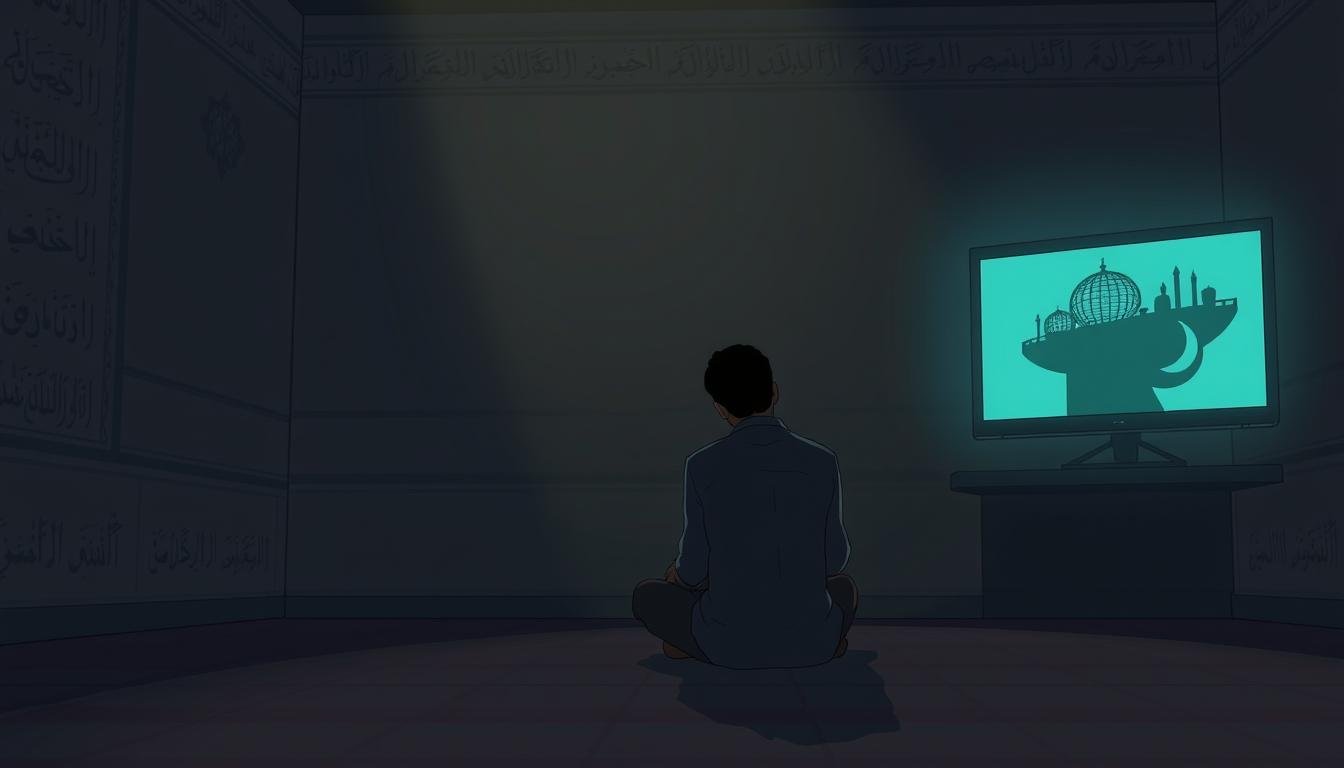As a Muslim in today’s world, I often think: can muslims watch porn? The question bothers us a lot. Our homes are filled with screens. Islam teaches us that porn is haram, a big no-no.
But it’s hard to resist in our endless scroll world. What does it mean to lower our gaze today?
Every time I read Surah An-Nur, I remember it’s not just rules. It’s about keeping our hearts pure. The Prophet said Allah gives each soul a chance to sin, but we can choose to avoid it.
We all slip up sometimes, but forgiveness is always there.
Every screen choice matters: does this image honor my soul? The Quran warns us about fuhsha, the obscenity that harms our faith. Scholars say watching porn is haram, not just a small mistake.
But Islam also offers hope. Repentance is a mercy for those who seek it. Let’s look into this together, mixing old traditions with today’s life.
Understanding Islam’s Approach to Sexual Content
Islamic teachings see sexuality as sacred, not for exploitation. The islamic view on pornography is based on valuing human dignity. It sees sexual content outside marriage, like pornography, as against the Quran’s teachings on modesty and purity.
At its heart, Islam’s ethics protect human worth. The idea of haya (modesty) tells Muslims to stay away from degrading images. Prophet Muhammad (peace be upon him) said looking at forbidden images is like committing adultery of the eyes—a sin that harms spiritual growth.
Today, over 4% of global websites have adult content, with 20% of mobile searches being for pornography. These numbers show why this topic is so important.
“The eyes and the private parts commit adultery before the body.”
These teachings aim to protect, not shame. The Quran warns against following desires that lead to obscenity (Quran 7:33).16).27). The punishment for adultery (zina) in Islamic law shows its seriousness, but the faith also offers a chance for repentance.
As teens go through puberty, Islamic values suggest talking openly. Parents and communities must balance being strict with being kind, guiding youth to healthy resources. Can we find a way to deal with today’s temptations and timeless values? The answer is in education and working together.
Islamic Principles on Modesty and Private Matters
Islamic teachings stress the importance of modesty. It guides us in our online and offline actions. The values of haya (modesty) and privacy help us know what’s right and wrong online.
The Concept of Haya (Modesty) in Islam
Haya is more than just clothes or looks. It’s about inner respect and ethical behavior. The Prophet (PBUH) said it’s key to faith, urging us to stay away from shameful acts.
In online spaces, this means not looking at things that make us feel ashamed. A hadith says:
“Allah is Haya and loves haya.”
This teaching encourages Muslims to be modest in all they do.
Preserving Dignity in Public and Private
Islam teaches that true dignity comes from Allah. This makes pride and showing off wrong. Keeping modesty online means protecting our personal space.
Online, we must be careful not to share too much. Looking at things we shouldn’t or sharing personal stuff is not okay. The Quran tells us to “lower our gaze” (24:30) everywhere, including online.
The Sacred Nature of Intimate Relations
Intimacy is a special gift from Allah, meant only for married couples. Surah An-Nur says sex should only be between spouses. This makes watching porn wrong, as it breaks this sacred trust.
By being modest, Muslims respect the beauty of relationships. They also protect their hearts from harm.
Can Muslims Watch Porn? The Straightforward Answer
Islamic teachings say no to watching porn. It’s haram. Scholars agree it goes against modesty, dignity, and ethics in the Quran and Sunnah. This rule protects our morals and keeps our communities strong.
So, why is porn forbidden? It shows us things we shouldn’t see, like non-mahram bodies. It also makes people into objects, not respecting their worth. Over 85% of teens see this stuff online by accident. This makes it even more important to follow this rule.

Our community needs to talk about this with kindness. Over 850 people at MuslimMatters want to discuss it openly. They know addiction is hard to beat.
The Prophet (SAW) taught us to take small steps. Like finding someone to be accountable to or praying. If you wonder if porn is haram, remember: saying sorry to Allah is the first step. We’re here to help each other stay on the right path.
Quranic Verses Related to Visual Temptations
Islamic teachings on visual modesty are key. Quran verses about lowering gaze are central, like Surah An-Nur 24:30-31. These verses tell both men and women to lower their gaze and be modest. Scholars say this means no porn.
The Quran emphasizes modesty in dress and behavior. It opposes the explicit images of porn. This is because porn harms our hearts and eyes.
Lowering the Gaze: Understanding Surah An-Nur
Surah An-Nur 24:30-31 talks about societal modesty. It tells believers to avoid forbidden sights. The Arabic term ghayr al-mahram means to avoid non-mahram relationships.
Today, watching porn is seen as a violation. It’s like raising your gaze instead of lowering it. This goes against the verse’s teachings.
Protecting Oneself from Obscenity
Verse 24:32 warns against approaching zina in any way. Scholars say looking at porn is like committing spiritual zina. Studies show 80% of adult content is coerced, matching Quranic warnings.
Surah An-Nur 24:37 links pure vision to divine protection. This shows the importance of keeping our eyes pure.
Broader Quranic Teachings on Moral Conduct
Quranic teachings like haya (modesty) and taqwa (God-consciousness) are important. Surah Al-Isra 17:32 warns against all kinds of obscenity. Today, algorithms push explicit ads, but Surah Al-Baqarah 2:229 offers a way out through prayer and community.
This aligns with 24:30-31’s call for moral responsibility. It shows we can overcome temptation together.
Prophetic Teachings on Protecting One’s Eyes and Heart
In today’s world, the Prophet’s warning about “adultery of the eyes” is very relevant. A hadith by Abu Hurairah says: “The adultery of the eyes is the sight—the adultery of the tongue is the talk—and the inner self wishes and desires.” This teaching warns us about looking at forbidden images, even before smartphones and streaming services.
“The inner self wishes and desires”—a reminder that viewing watching porn in islam isn’t just a fleeting act but a chain reaction shaping desires.
Studies show 40% of Muslim youth see pornography online, just like the Prophet warned. He told us to “guard your gaze.” This isn’t just advice—it’s a way to avoid feeling numb (52% report spiritual disconnection) and broken relationships (56% of couples say porn is a trust issue).
The Prophet balanced being strict with being kind. He said, “Lower your gaze when tempted,” but also, “Seek forgiveness for your slips.” Today, we can use tools like content blockers. We must protect our eyes and hearts, not let them be used for casual pleasure. Will we follow algorithms or timeless wisdom?
Modern Islamic Scholarly Perspectives
In today’s digital world, islamic scholars on porn stick to old teachings. The islamic ruling on sexual content is clear: watching porn goes against Islamic values. Experts like Shaykh Muhammad Nur Abdullah and Dr. Muzammil Siddiqi say it’s like Fuhsha—very bad actions. They point to Quran 7:33 and 24:19 for proof. This rule is for all kinds of content, like videos and photos. 
consensus among contemporary scholars>All big scholars agree—porn is totally forbidden. They all agree, no matter where they are or how they think. For example, Al-Munkar (immorality) means anything that goes against haya (modesty). Even new fatwas say digital access doesn’t change this rule. One saying warns: “The gaze commits adultery” if it looks at forbidden pictures.
fatwa explanations on digital content>Digital stuff makes it easier to see more—like getting porn emails 8 times a week on average. Fatwas say looking at it is like doing it. Scholars remind us to avoid near-wrongdoing, as Quran 6:151 says. Being online doesn’t mean you’re not accountable. As one scholar says: “Your screen shows what you really want.”
distinguishing between cultural norms and religious rulings>Even though America is okay with porn, Islam says no to it as Al-Mafsat (corruption). Just because media is okay with it doesn’t mean it’s okay in Islam. Quran 24:19 tells us not to spread bad stuff—online or offline. It’s hard to mix cultural openness with keeping to faith’s rules. Dr. Siddiqi suggests: “Taking a break from digital stuff is good for your soul.”
The Psychological Impact of Pornography Through an Islamic Lens
Looking at the islamic view on pornography, we see its harm to our minds and souls. Studies show 70% of young adults think porn is normal, and 30% of men struggle with erectile dysfunction because of it. This matches Islamic teachings that warn against actions that harm the qalb (heart).
The Prophet Muhammad (peace be upon him) said sin is like rust on the heart. This idea is seen in today’s understanding of how porn makes us less sensitive.
Research shows too much porn changes how we see love, causing problems in real relationships. The AWARE campaign found 80% of people know someone struggling with pornography addiction islam. This matches Islamic views on marriage as a sacred bond, not just a deal.
When we get used to porn, our brains start to crave it like a drug. Scholars say this is like what the Quran warns against (Quran 6:125). The results? We feel anxious, depressed, and our self-worth drops.
But, 70% of people who stop using porn say they feel better. Islamic teachings offer help: working with others and seeking forgiveness to find peace again.
We must teach young people about the dangers of porn, as boys are exposed by age 12. The Prophet’s advice to “guard your eyes” is timeless advice for keeping our minds and hearts safe. By using faith and science together, we can protect our values and promote better online habits.
Navigating Temptation in the Digital Age
In today’s world, keeping modesty online is key. We must take steps to follow Islamic values. Technology brings both problems and answers, like being careful with what we browse and setting digital limits.
How do we mix modern life with our faith?
Practical Strategies for Muslim Internet Users
Begin by being mindful of what you look at online. Spend less time on sites that are bad for you. Teach kids about privacy and hijab early on.
Parents, watch how much screen time your kids have. Talk to them about being good online. The Prophet said, “The eyes commit adultery” (Ahmad). So, watch your eyes online too.
Digital Accountability Tools
Tools like Qibla Browser or Safesurf help block bad content. They also track how much time you spend online. These tools help us stay true to our faith online.
Put these tools on all devices. This makes the internet safer for everyone.
Community Support Systems
Having a strong community helps us stay strong. Look for Islamic counseling that uses CBT and faith. Share your struggles in mosques or online groups.
When one Muslim does well, we all do better. The Quran tells us to be “steadfast witnesses” (2:143). By following these steps, we honor our faith and modern life. Together, we can grow spiritually.
Addressing Addiction and Seeking Help Within Islamic Framework
Breaking free from pornography addiction islam needs spiritual strength and help. The first step is tawbah for watching porn, turning to Allah with humility. The Prophet (peace be upon him) reminded us, “Allah’s mercy precedes His anger.”
“The doors of repentance are open until the sun rises from the west.”
Many seek Islamic counseling for porn addiction, a problem in the Quran. It talks about guarding our hearts and eyes. To overcome, join groups, use tools like Purify Your Gaze, and get community support. Over 80% of those who seek help say their faith grows stronger.
MyTazkiyah shows how Islam helps us heal (learn more here). Daily Quran and therapy help a lot. Scholars say addiction is a challenge, not a moral issue. Replace bad habits with good ones, like volunteering or learning Arabic.
Remember, tawbah for watching porn is a daily choice. It’s about living by Islamic values. The Prophet (peace be upon him) said, “Allah loves those who turn to Him constantly.” This journey is about growing spiritually, not shame. Seek help from imams, online groups, or counselors. Every step brings you closer to Allah’s mercy.
Guidance for Muslims Struggling with Visual Temptations
Islam offers timeless guidance on visual temptations. It focuses on human dignity. Every struggle is a chance to grow, as the Quran says: “Allah does not burden a soul beyond its capacity” (2:286).
Seeking Tawbah and Forgiveness
Repentance is the first step. Say “Astaghfirullah” (I seek forgiveness from Allah) every day. Be sincere. Remember Surah Al-Asr: “Verily, man is in loss except those who believe and do righteous deeds.”
Replace shame with hope. Allah’s mercy is greater than any mistake.
Practical Steps Rooted in Faith
Start daily routines to keep your heart grounded. Prayer (salat) helps fight desire—90% find it effective. Add dhikr (remembrance), exercise, and fasting to your routine.
Keep a journal for 30 days to track your progress. Write down what triggers you and replace it with Quranic verses or acts of kindness.
Community and Professional Support
You’re not alone on this journey. Talk to trusted scholars or counselors—they offer free help. Halal socializing and marriage are key for many Muslims.
Online platforms like Imaan or Muslim Match are good places to meet others. 80% of strugglers find support networks essential for success.
Allah says, “Turn to your Lord in repentance, and submit to Him” (110:3). This journey takes time, but patience and community can lead to change. Your worth is not in your past but in your will to return to faith.
FAQ
Is watching pornography considered haram in Islam?
How does Islam view sexuality in general?
What is the significance of the concept of haya (modesty) in Islam?
Are there Quranic verses that address visual temptations?
What prophetic teachings exist concerning visual ethics?
How do modern scholars approach the issue of pornography?
What psychological impacts does pornography have according to Islamic teachings?
What practical strategies can Muslims use to navigate the digital age and its temptations?
How should addiction to pornography be addressed from an Islamic perspective?
What guidance is available for Muslims struggling with visual temptations?

Embracing Faith, One Insight at a Time!
The teachings of the Quran have always guided my path. With a deep passion for Islamic knowledge, I strive to blend the wisdom of tradition with the relevance of today, making the timeless messages of Islam accessible and meaningful for everyone.
Muslim Culture Hub is my platform to share historical insights and thought-provoking articles, exploring both well-known and lesser-discussed aspects of Islamic culture and beliefs. My mission is to create an inclusive online space where everyone can learn, strengthen their faith, and connect with the profound message of Islam.
Join the journey!
May peace be upon you.








